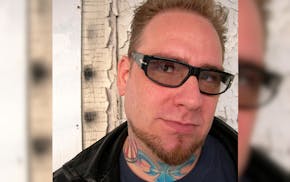He never made a big deal of it, but whenever Garrett Wilson sat down for a meal, he would set aside a bite of food on his plate. His friend Armin Schmidt once asked him why. "Oh, that's for the spirits," said Wilson, a Sisseton Dakota elder.
Wilson died Dec. 23 of natural causes in his home. He was 79.
"The spirit world was always right there with him," said Schmidt, former executive director of the Council for American Indian Ministry. "That kind of gave him the orientation and bearing, that sense of connectedness he always had."
Wilson, whose Dakota name was "Do Not Stand in Front of Black Buffalo," was one of the last few Dakota first-language speakers in the state.
"He was an international dignitary and a beautiful, benevolent leader in our community," said his son Jim Rock, an astronomer-educator at the Minnesota Planetarium Society. "But I think the things he would want to be most known for are the things he did every day, steadily, for others."
Born on the Sisseton Wahpeton Dakota Reservation in South Dakota, Wilson didn't speak English until he was 8. Tall and lanky, he was a star basketball player at Flandreau Indian School, and he wanted to be a coach someday. Those plans were derailed when he was injured while a paratrooper during the Korean War, said his wife, Lynne Young.
He worked industrial jobs in Milwaukee before moving to Minneapolis in the early 1970s, where he became quickly known in Indian circles as wise and gentle.
A recovering alcoholic, he would have marked 36 years of sobriety on Jan. 12. The day he became sober was the only day he ever prayed for himself, Young said, adding that all subsequent prayers were for others, living and dead.
"He was such a beautiful light to the world, and it's hard to imagine life without him," said Rock's wife, Roxanne Gould, an instructor of education and American Indian studies at Augsburg College. "But we know that he's back with his ancestors. We know his ability to love us and help us is even greater now."
Wilson's ministry was a mixture of Christianity and native spirituality. He was president and elder of All Nations Indian Church in Minneapolis, where he reached out to young children, troubled youth and prisoners.
With his death, an encyclopedia of Dakota knowledge is gone. "His ministry was never to preach," Young said. "His ministry was to listen and offer a prayer, a touch, or some advice in a quiet and humble way."
Four values are held most dearly by the Dakota people, Rock said: wisdom, generosity, perseverance and bravery. "We wish it wasn't so rare that one person could carry all of our values," Rock said. "But Dad was known nationally, or even globally, as one who did just that."
Services have been held.
Abby Simons • 612-673-4921

Whitey Herzog, who managed Cardinals vs. Twins in 1987 World Series, dies

Official who helped MSHSL on pioneering ventures dies at 89

Former 'KQRS Morning Show' prankster Lee Siegfried, aka Crazy Cabbie, dies at 55

Richard Serra, who recast sculpture on a massive scale, dies at 85

